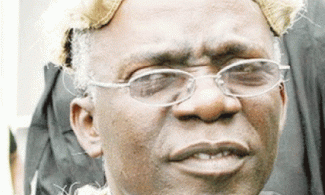
Human rights lawyer Femi Falana, who is also a Senior Advocate of Nigeria (SAN), has stated that the controversial presidential pardon recently granted to convicted former Governor Diepreye Alamieyeseigha of Bayelsa State, was likely to open a dangerous floodgate for criminal impunity.
Human rights lawyer Femi Falana, who is also a Senior Advocate of Nigeria (SAN), has stated that the controversial presidential pardon recently granted to convicted former Governor Diepreye Alamieyeseigha of Bayelsa State, was likely to open a dangerous floodgate for criminal impunity.
googletag.cmd.push(function() { googletag.display('content1'); });
In a brief interview with a Lagos correspondent of Saharareporters earlier today, Mr. Falana stated that President Goodluck Jonathan’s extension of clemency to Mr. Alamieyeseigha would jeopardize the prosecution of other corrupt former governors whose cases are currently in court.
Mr. Falana also recalled a court’s recent decision to grant a perpetual injunction against the Economic and Financial Crimes Commission. He suggested that the injunction, which came in the wake of the widely criticized pardon of the former Bayelsa governor, did not augur well for the anti-corruption crusade.
Mr. Falana disclosed that progressive lawyers in the country were planning a new convention, adding that the group would help to combat injustices in the country and arrest the march to anarchy.
Excerpts:
Question: Since the president can free criminals on his sheer caprices, regardless of how many years and how much it cost the EFCC to secure the conviction of high ranking criminals, do you think the EFCC still has purpose to its existence?
Falana: In order to ensure that the power is not exercised capriciously or arbitrarily, the President is required to consult the Council of State, a body constituted by former Presidents (but not ex-military dictators), current and past chief justices and Senate President, House Speaker, governors and the attorney-general of the federation. The council is expected to take the interests of the country into consideration in advising the President in exercising the prerogative of mercy.
The statement credited to the Adamawa state governor, Alhaji Murtala Nyako, that the pardon for those who were jailed for corruption was not tabled before the Council has not been denied. I guess that the other people who were at the meeting have resolved to keep quiet so as not to embarrass the President. But the last has not heard on the matter as one of the NGOs has demanded for the minutes of the meeting of the Council of State under the FOI Act. Sentiments apart, the power to grant pardon or clemency or even amnesty can be exercised by the President or governor depending on the circumstances of each case. In 1976, President Gerald Ford lost the election to Mr. Jimmy Carter because of the pardon granted his predecessor, Mr. Richard Nixon. Mr. Bill Clinton got away with the controversial pardon granted by him because he did it on his last day in office. So, if the power is exercised recklessly, the President can be called to order.
googletag.cmd.push(function() { googletag.display('content2'); });
Frankly speaking, the pardon of Chief DSP Alamieyeseigha has to be viewed in the context of the general atmosphere of impunity. This has aided other ex-governors to stall their cases. One of them got a perpetual injunction against the EFCC. Another one had a 171-count charge dismissed by a court in Nigeria only for the same fellow to plead guilty to similar charges in the UK where he was convicted and jailed. Instead of dissipating energies on the pardon we need to strengthen the EFCC and ICPC [Independent Corrupt Practices Commission] and build a new legal system which will institutionalize the rule of law. Right now, we have the rule of man. Hence, only the poor are jailed while the rich and powerful citizens are above the law. In such a situation the rich who may be jailed for one reason or another are pardoned by the President.
Question: Given the president’s ability to jeopardize the work of anti-graft agencies merely by one decision, would you propose a limitation to the power of the president on intervening in criminal matters and/or granting pardon to criminals?
Falana: The EFCC and judges handling corruption cases deserve our sympathy because impunity has become the order of the day. A few progressive lawyers and I are meeting soon to arrest the manipulation of the legal system by a visionless ruling class aided by some senior lawyers. We intend to mobilize our colleagues in the legal profession to appreciate the enormity of the crisis of injustice in the land. It is going to be a tough struggle but we are determined to succeed. Otherwise, we are going to have anarchy and chaos in the country.
googletag.cmd.push(function() { googletag.display('comments'); });